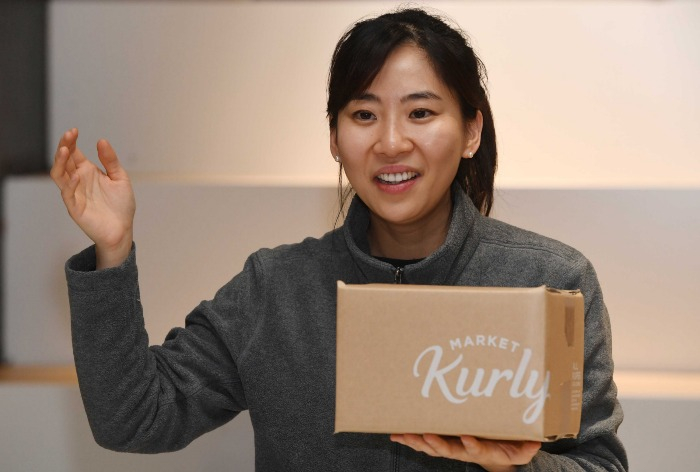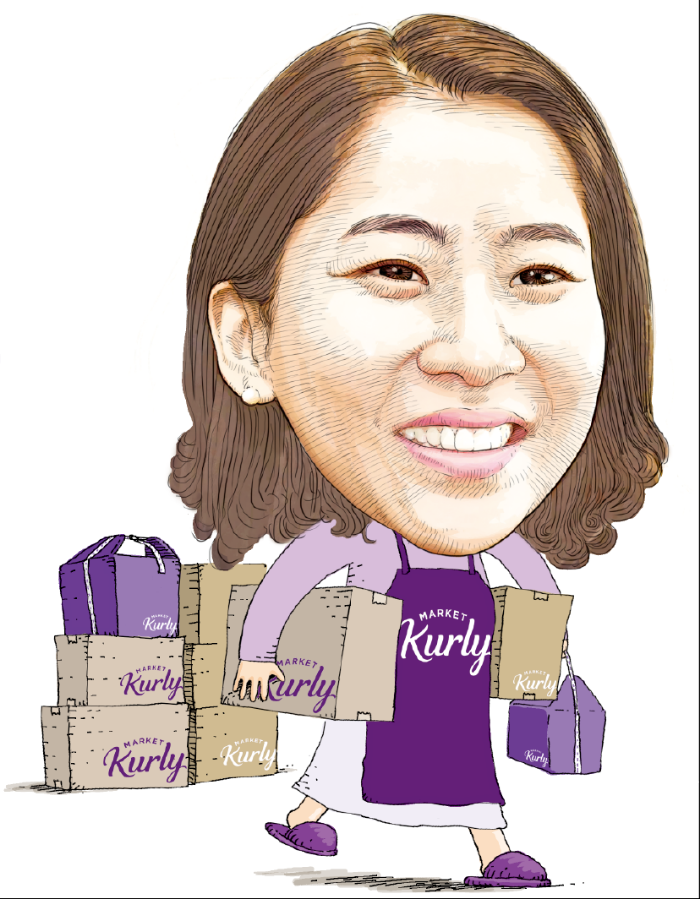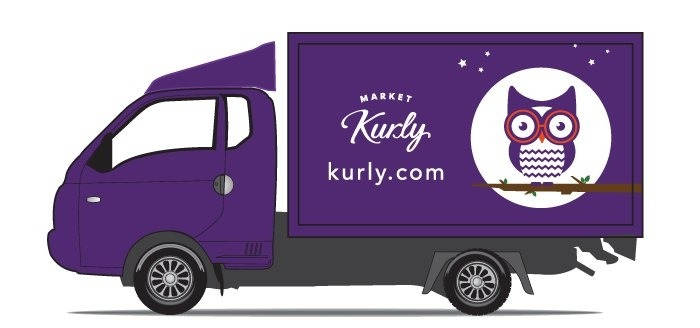Chief Executives
Kurly CEO Sophie Kim on the road less traveled┬Ā
The former investment banker advises entrepreneurship only with strong conviction
By Jan 19, 2022 (Gmt+09:00)
6
Min read
Most Read
Samsung shifts to emergency mode with 6-day work week for executives


CJ CheilJedang to sell feed, livestock unit for $1.4 bn


Samsung Electronics' key M&A man returns; big deals in the offing


Affinity to buy SK Rent-a-Car at $572 mn, more deals expected


Keppel REIT to sell Seoul-based prime office T Tower



Reminiscing about the day, the 38-year-old said, ŌĆ£My husband asked me why we had to come all the way [to the store.] I had told him that Costco has the best Korean-style braised short ribs and that I cannot turn back.ŌĆØ┬Ā
Kim has always been passionate about good grubs.┬Ā
The creator of Dawn Delivery says she has always been looking for ways to alleviate the concerns of homemakers at grocery stores. That thinking is the driving force behind the rapid rise of Market Kurly, the companyŌĆÖs online grocery delivery app and service.
On the first day of 2015, Kim founded The Farmers ŌĆō now rebranded as Kurly.┬Ā
Still, the former investment banker and consultant had no experience in the retail distribution industry.┬Ā
What was going for her was her passion for food. Kim did not think as a supplier but constantly asked herself about what customers would want instead.
ŌĆ£When the question changes, so does the answer,ŌĆØ Kim said. Figuring out how to materialize what customers want has been part of KurlyŌĆÖs roadmap. Thanks to such inquiries, unprecedented services like overnight delivery and curated shopping lists were born.
In her own words, Kim says not following the existing patterns of business turned out to be the reason behind the success.┬Ā
ŌĆ£Sometimes I ask myself if putting this much effort is really worthwhile; but each employeeŌĆÖs goals are ultimately intertwined with the companyŌĆÖs objective,ŌĆØ Kim said with a cheeky smile. ŌĆ£If a customer wants a live octopus, even if that is [logistically] hard, we must do it.ŌĆØ
KimŌĆÖs brainchild Market Kurly was the first launch overnight delivery service, which is now part of the countryŌĆÖs delivery culture. Even though the adoption sped up the delivery of online purchases in a dramatic way, Kim said that is not the essence of her business.┬Ā
Then what is?
To the entrepreneur, product differentiation is KurlyŌĆÖs essence and competitive edge in the online fresh produce industry.┬Ā
Kim described the competition over delivery speed, without taking the product itself into consideration, is just a sensation-seeking side issue. She added, ŌĆ£Sure, you could use the service in an urgent case but that does not ultimately resolve the needs of wanting to purchase a product after seeing it in person.ŌĆØ┬Ā
The Wellesley College graduate went a step further to say the essence of the Kurly business lies in education. ŌĆ£For a startup to change the structure set by previous businesses, it must first change the consumersŌĆÖ perceptions about food,ŌĆØ she emphasized.
ŌĆ£Consumers will get online only when they can discern a good product. This requires a change in habits,ŌĆØ Kim explained. ŌĆ£Market Kurly fares better the more people change their minds and become particular about food. If the perception about food does not change, however, that is more advantageous to conventional businesses.ŌĆØ┬Ā
This is why newcomers in any business must consider convincing consumers in various ways, she said.┬Ā

Some say Kim has celebrity status.┬Ā
Even though there were times when she had to worry about paying her employees and for the goods to vendors; recently, Kurly's pre-IPO corporate value was estimated to be 4 trillion won ($3.4 billion.)
Her theory on startup can be summed up as: Extreme candor is the foundation of healthy organizational culture.┬Ā
In an interview with The Korea Economic Daily, Kim stressed that a colleague is not a mate and that a family-like company does not exist. With this in mind, she said the difference in opinions could be resolved quickly through open conversations. When things are unresolvable, she believes the involved parties should go separate ways.┬Ā
ŌĆ£When there is smooth communication, there are no hard feelings that build up within an organization,ŌĆØ she said. ŌĆ£But when such negative sentiments explode, more energy gets wasted trying to get back on track.ŌĆØ┬Ā
Kim emphasized that the reasons behind quitting a company are better reflections on an organizational culture than whether the turnover rate is high or low.┬Ā
As for the reasons for becoming an entrepreneur, Kim said she does not recommend starting a business if the goal is to make money or because the job looks fun. Even when the corporate value goes up, that does not mean the founder can necessarily monetize it. She also said finding entrepreneurship to be enjoyable is naive thinking.┬Ā
Instead, Kim advised only starting a business if one believes not doing so would be a regret of a lifetime. In other words, only try it when there is a strong conviction. Without it, she said, ŌĆ£Entrepreneurship is a struggle on a day-to-day basis.ŌĆØ
KimŌĆÖs initial plan was to pursue a doctoral degree in development economics. It was the words of her would-be academic advisor that made her turn to entrepreneurship.┬Ā
ŌĆ£The professor told me that if I were to pursue a masterŌĆÖs degree at that time, I would become malpositioned with one side of the brain much bigger than the rest so to speak,ŌĆØ Kim recalled. ŌĆ£The advice was that I could become a better academic once I have experienced the market first hand.ŌĆØ┬Ā
So Kim joined US investment bank Goldman Sachs, and subsequently other well-known consulting and investment firms such as McKinsey & Company, Temasek, and Bain & Company.┬Ā
Even though Kim has created a unicorn in the food commerce industry, she still reads books on development economics during her free time.

Ahead of this yearŌĆÖs upcoming IPO, Kim revealed a performance-based compensation plan for all employees ŌĆō a first since its founding seven years ago.┬Ā
According to the plan, all regular employees will receive stock options. That is, excluding the C-level executives.┬Ā
The reason why she took an entirely different approach from other companies is to allow for more stock allocation to regular employees. The standard for stock options distribution is also not based on titles or performance but by the years of employment at Kurly.┬Ā
Contract workers will receive cash incentives.
Kim added, ŌĆ£The reason why we are planning an IPO in Korea rather than in the United States is to share the fruits of our labor with everyone who worked to make it happen.ŌĆØ┬Ā
In the spirit of sharing, Kim said she does not mind lowering the share of her stocks in Kurly. She had a 6.67% share of her company in late 2020 and that figure is estimated to be around 5% as of now.┬Ā
Kim said she does not mind whether her share is 5% or 50%; as long as whoever is the most capable is in charge of management.┬Ā
To deal with stress, Kim said she orders a lot from her own company. ŌĆ£I really enjoy seeing the delivery at the door in the morning, thinking about enjoying them all.ŌĆØ┬Ā
Write to Han-Shin Park at phs@hankyung.com
Jee Abbey Lee edited this article.
More to Read
-

-
 StartupsKorean unicorns jump fivefold in four years with record investment in 2021
StartupsKorean unicorns jump fivefold in four years with record investment in 2021Dec 20, 2021 (Gmt+09:00)
4 Min read -
 Pre-IPO fundingMarket Kurly raises $200 mn at over $3 bn valuation
Pre-IPO fundingMarket Kurly raises $200 mn at over $3 bn valuationDec 01, 2021 (Gmt+09:00)
1 Min read -

-

Comment 0
LOG IN


